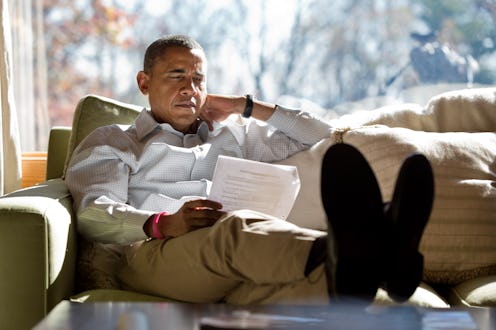Books
Why It's So Horrifying That Donald Trump Doesn't Read Books

Much has been made of the fact that one of the most literary presidents in U.S. history (by some accounts, Barack Obama recommended 97 books during his time in office) was immediately succeeded by a man who might not recognize a book if he tripped over it on the way to his early morning tweet. It’s no secret that President Obama was, and is, a lover of the written word, while his successor — eh, not so much.
In his — admittedly contested — book, Fire and Fury: Inside the Trump White House, author Michael Wolff wrote of President Donald Trump: “He didn’t process information in any conventional sense. He didn’t read. He didn’t really even skim. Some believed that for all practical purposes he was no more than semi-literate.” Now, blatantly disregarding your teleprompter or neglecting to peruse your daily intelligence briefings — that’s a problem of governance, and a significant one. But being completely oblivious to literature? That, I would argue, is a crisis of character.
Certainly, my feelings about the current White House administration are no secret. Am I still salty that more of America wasn’t finally ready to elect the first female president of the United States? Definitely. But that, really, is entirely beside the point. Whether you voted for Donald Trump and have yet to be disillusioned by his presidency, or are convinced that America is on the fast track to fascism, you should care that he reportedly doesn’t read. We all should.
Admittedly, I don’t think the current President’s rudimentary tweeting is an accurate depiction of his grasp on the English language. He must know words, even if he can’t always spell them correctly. (In fact, he’s claimed to have all of the best ones.) Rather, that he chooses such language with which to address the American public, and the world, is a problem. The fact that so many of us tweet back in kind is too. Presidents and politics come and go, but language — and the literature of a language — lasts lifetimes.
No matter where on the political spectrum you fall, we should all want our presidents to be readers. Here’s why:
It demonstrates an ability and a desire to think outside your own experience.
I’d argue that having both an ability and a desire to consider the experience of those whom you’re leading (or governing) is perhaps the most important quality in a president. Every single policy implemented or destroyed should begin from a place of care and interest for the experience of those you’re presiding over. Reading creates space for that care and interest to grow. President Trump will surely never know what it’s like to be, say, a woman of color from Detroit, a gay man from Tuscaloosa, a pregnant teen from El Paso, an undocumented immigrant in Chicago — but reading can at least suggest what those lives, and many others, might be like. As that old quote says: “Remember that ... it is nearly impossible to hate anyone whose story you know.”
That thing about history and dooming oneself to repeat it.
While the history of the United States and the world has hardly been documented in full, or from all perspectives, there’s still something to be said for knowing at least a bit of it — and considering that history when making decisions that will have consequences for generations to come. Interestingly enough, a good bit of that history can be discovered by reading. Just sayin'.
Reading cultivates empathy.
Anyone who has fallen head-over-heels in love with a fictional (or even a nonfictional) person they’ve met in a book knows that reading can cultivate just as much empathy as real-world relationships — sometimes more. That empathy is critical to fair, reasonable, and well-rounded governing (I mean, I’d imagine, right?). Similar to reading’s ability to facilitate thinking outside one’s own experience, reading can also facilitate feeling outside one’s own experience as well.
It can inspire creative solutions to problem solving.
Before presidents were the folks who caused problems, they were the folks designated to fix them. You don’t need me to tell you that the world is chock full of complex problems — always has been, and always will be. While problem solving in the real world is hardly as tidy as problem solving in, say, a 250 page novel, reading both fiction and nonfiction can still suggest creative solutions to a myriad of concerns, both large and small, that one might face in any given day. Just consider Meg Murry, for example; all that girl did was solve complex problems. She even used math.
Reading improves communication skills.
One other must-have quality in a successful president? An ability to communicate not to the few, but to the many. Even — *gasp* — people who don’t agree with or even remotely like you. Not only, on a practical level, does reading enhance one’s vocabulary (well beyond, for example, four-letter words) it also enables one’s ability to communicate in a variety of different styles, to a variety of different people. Why? Because that’s what books themselves do. And I have to say, I've never once been raged-tweeted by a book.